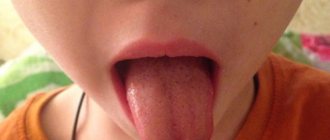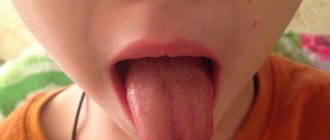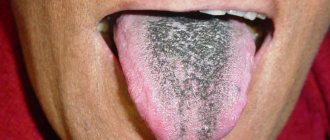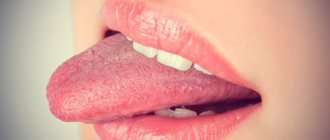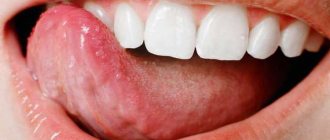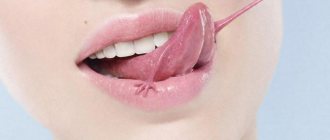In most cases, the term “neurosis” is associated with emotional lability, irritability, and a general deterioration in well-being. But sometimes neurotic disorders manifest themselves with completely unexpected symptoms, which causes an incorrect diagnosis and, accordingly, ineffective treatment. In some cases, the tongue may react to stressful situations and anxiety during neuroses. There is a distinct discomfort that is not associated with organic pathologies of the oral cavity. This condition is called glossalgia or language neurosis. Medicines prescribed by general practitioners either do not work or have only a short-term effect, but doctors at the Leto mental health center, if the psychogenic nature of the disease is suspected, offer a comprehensive examination to exclude somatic diseases. After confirming the diagnosis, we select psychotherapy tactics and, if necessary, add medications.
Causes of glossalgia
As with other somatoform neurotic disorders, the etiology of language neurosis is closely related to the influence of stress factors. This is any situation that is psychologically traumatic for a person, for example:
- conflicts in the family, serious quarrel with relatives, betrayal of a spouse, divorce;
- demotion (or lack of long-awaited career advancement), job loss;
- personal or global financial crisis, especially against the backdrop of the need to make regular loan payments;
- suffered a serious illness and fear of re-illness (relapse);
- any disaster (experienced earthquake, flood, fire, transport accident, etc.).
Persons who tend to repeatedly exaggerate the scale of existing problems are predisposed to language neurosis. Usually they lack optimism, do not like fun, do not like to joke themselves, and avoid noisy companies for fear of appearing funny. They are very demanding of others and are afraid of losing control of the situation. Therefore, in families where one or both parents have signs of a neurotic syndrome, the unquestioning authority of the father or mother usually “reigns”, children suffer from overprotection.
How to treat?
The disease should be treated in the early stages of development. Chronic pathology is practically not amenable to medication and will periodically remind itself. To treat the disease, antiviral, anti-inflammatory medications, and sometimes antibiotics are usually prescribed. Particular attention is paid to local treatment.
During the therapeutic process, patients are recommended to take medications that will increase salivary secretion. Medicines such as Pilocarpine, Potassium Iodide and Galantamine are usually administered using physiotherapeutic methods (electrophoresis, galvanization). In cases of severe pain, novocaine blockades are used. Surgery is indicated only in severe cases, when inflammation under the tongue is accompanied by the formation of purulent accumulations.
Treatment of a chronic inflammatory process in the salivary glands takes a longer time. Doctors recommend that during exacerbations of the disease, taking antibacterial drugs and medications that will increase the secretion of salivary fluid. Patients suffering from a chronic type of sialadenitis need regular prevention of pathology.
Symptoms of tongue neurosis
The syndrome has a very variable clinical picture; often the patient himself cannot find the appropriate words to describe his feelings. But the most common complaints are:
- tingling, numbness, itching, burning of the tongue, lips and oral mucosa;
- sensations of puffiness, swelling and heaviness of the tongue, as if it had been “sprinkled with pepper” or “scalded with boiling water”, dry mouth;
- impaired taste sensitivity, decreased salivation, often against this background appetite worsens and weight decreases;
- raw pain in the palate, tonsils, back of the throat;
- partial numbness of the mucous membrane;
- sensation of a foreign body in the mouth.
Discomfort occurs periodically; at the initial stage of the disorder, the duration of this kind of “attack” is 2–5 minutes, gradually unpleasant sensations appear more and more often and become permanent over time. Numbness of the tongue during neurosis, like other symptoms of the disorder, increases with the consumption of alcohol, peppery foods, pickles, too cold or vice versa, hot food and drinks.
The patient is convinced that because his tongue is swollen, he cannot speak clearly. A person reduces communication to a minimum, prefers correspondence to conversation and personal meetings, which does not have the best effect on speech functions and socialization skills in general.
A coated tongue during neurosis is uncharacteristic; the presence of plaque indicates the presence of a bacterial or viral process, but it is possible that it is of a secondary nature. For example, due to severe discomfort, a person constantly touches his face and lips with his hands, which provokes the development of an infectious process.
In addition, glossalgia often leads to a decrease in local immune defense. That is why tongue neurosis is often accompanied by stomatitis, laryngitis, chronic tonsillitis and/or pharyngitis.
Symptoms from the psycho-emotional sphere are also characteristic. A person experiences constant anxiety and internal tension. Characterized by insomnia with nightmares and restless dreams, irritability and intolerance, gloominess.
Appearance in children
Children often face this problem. The appearance of similar symptoms in a child almost always indicates the development of candidiasis. Here it is necessary to conduct a careful visual examination of the oral mucosa for the presence of a dense white coating with a cheesy consistency - this is the very first sign of the pathology in question.
Stomatitis is common in infants.
A frequent accompanying symptom is burning, and this is a good reason for parents to worry. Here you need to monitor the child’s psycho-emotional state, make sure that he does not experience any serious worries or stress. If you suspect that the cause of the itching lies precisely in the psychological state of the baby, it makes sense to show him to a neurologist.
Diagnosis of tongue neurosis
The fact is that the etiology of numbness, coating on the tongue and other manifestations of oral discomfort is sometimes not associated with stress. The reasons for such unpleasant sensations may be:
- Diseases of the digestive tract. In particular, the backflow (reflux) of intestinal contents into the trachea causes pain and a burning sensation in the throat and tongue.
- Circulatory disorders due to cardiac disorders.
- Neurological and endocrine pathologies.
- Allergic reaction to topical medications (rinses, lozenges, etc.).
- Infection of the oral cavity (usually stomatitis, fungal diseases).
Often characteristic symptoms occur after visiting the dentist. Glossalgia often appears after prosthetics due to injuries during orthopedic manipulations, allergies to the material from which the prostheses are made. The syndrome can also be a consequence of malocclusion, constant injury to the oral mucosa by unsuccessfully placed fillings, or dental plaque.
Many experts forget about the rather rare, but noteworthy syndrome of “galvanism” - insignificant electrical discharges that appear in the mouth in the presence of fillings or prostheses made of metal alloys, due to which the tongue becomes numb and pain appears.
To exclude the somatic etiology of the disorder, consultation with a dentist, ENT specialist, neurologist, cardiologist and gastroenterologist is necessary. The patient is also asked to take a general and biochemical blood test and do an ECG. It is advised to undergo a study to determine the indicators of local immunity of the oral cavity, assess the enzymatic activity of the salivary fluid, the content of protein and other elements in it, and the pH level.
If the pain is associated with damage to the frenulum
The hyoid frenulum is a mucous membrane that connects the tongue to the base of the mouth. Inflammation can be caused by:
- Diseases occurring in the oral cavity - stomatitis, gingivitis, periodontitis;
- Using incorrect hygiene products: toothpaste, toothbrush, mouthwash;
- Allergies caused by taking medications.
Inflammation of the frenulum under the tongue can also occur as a result of injury to it during brushing teeth, eating (too hot or cold foods), talking loudly, sharply biting the tongue, or careless handling of cutlery.
The reason why it hurts under the tongue may also be a physiological feature. In cases where the frenulum is short from birth, the likelihood of damage increases significantly, and discomfort can occur even while eating.
A visit to the dentist cannot be avoided if the frenulum under the tongue hurts. The doctor will examine the damage and prescribe treatment. At home, especially if you can’t immediately visit a specialist, in order to relieve pain, you can rinse your mouth:
- Soda solution (a teaspoon per glass of chilled boiling water);
- Chamomile or sage decoction;
- Preparations: Stomatofit, Rotokan, Chorophyllipt.
Also, if the frenulum under the tongue is inflamed, it is recommended to treat the affected area with Iodinol or place a cotton swab dipped in sea buckthorn oil at the damaged area. Such measures can only be used in cases where you know for sure that the cause of the pain under the tongue is an inflamed frenulum.
The tongue is connected to the lower jaw thanks to the frenulum - a thin membrane of skin. It holds the tongue and participates in the formation of the correct pronunciation of sounds. It contains a large number of nerve endings and blood vessels. Therefore, with the development of a pathological condition, the frenulum becomes especially sensitive. During the inflammatory process, doing familiar things - talking, chewing food - becomes painful.
Inflammation of the hyoid frenulum can be provoked by various dental diseases, injuries associated with active work of the oral cavity, inflammation of the lymph nodes or tissues of the tongue, and bad habits. The painful sensations that arise in this case negatively affect the quality of life. To identify the true etiology of the syndrome, it is necessary to consult a doctor.
Cost of services
| CONSULTATIONS OF SPECIALISTS | |
| Initial consultation with a psychiatrist (60 min.) | 6,000 rub. |
| Repeated consultation | 5,000 rub. |
| Consultation with a psychiatrist-narcologist (60 min.) | 5,000 rub. |
| Consultation with a psychologist | 3,500 rub. |
| Consultation with Gromova E.V. (50 minutes) | 12,000 rub. |
| PSYCHOTHERAPY | |
| Psychotherapy (session) | 7,000 rub. |
| Psychotherapy (5 sessions) | 30,000 rub. |
| Psychotherapy (10 sessions) | 60,000 rub. |
| Group psychotherapy (3-7 people) | 3,500 rub. |
| Psychotherapy session with E.V. Gromova (50 minutes) | 12,000 rub. |
This list does not contain all prices for services provided by our clinic. The full price list can be found on the “Prices” , or by calling: 8(969)060-93-93. Initial consultation is FREE!
Diagnostic measures
The only correct decision regarding the appearance of the symptoms described above is to contact a knowledgeable specialist. Only a doctor can conduct a competent examination and identify the true cause of the discomfort. Thus, the main diagnostic procedures include:
- general blood analysis,
- taking a swab from the throat.
Tests can determine the true cause of the problem
Having the test results in hand, the doctor can significantly narrow the range of suspected diseases and even immediately make an accurate diagnosis. It is likely that at the stage of identifying the source of the problem, consultation with highly specialized specialists - a dentist, neurologist, gastroenterologist - may be required. Without knowing the exact doctor’s conclusion, you should not make any attempts to solve the problem yourself, otherwise you can only worsen the situation.
Principles of treatment
The treatment regimen proposed by the doctors of the Leto clinic is aimed at restoring normal psycho-emotional status, eliminating symptoms that bother the patient and preventing secondary complications. If the tongue twitches during neurosis or other symptoms of the syndrome are pronounced, drug treatment is indicated. It includes:
- sedatives;
- non-benzodiazepine anxiolytics;
- according to indications (for example, for severe insomnia) - antipsychotics;
- B vitamins, tocopherol, omega complex;
- nicotinic and ascorbic acid, drugs based on adenosine triphosphoric acid, glycine;
- iron supplements.
Various physiotherapeutic procedures that have a relaxing and calming effect have proven themselves well. We recommend:
- massage of the collar area;
- ozone and oxygen therapy;
- transcutaneous and transcranial electrical stimulation;
- hirudotherapy;
- laser therapy.
Regardless of clinical manifestations, neurotic disorders are an indication for consultation with a psychologist. The doctor will help the patient understand the cause of such unpleasant sensations, tell him how to properly respond to conflict and stressful situations, and help him find a solution to the problems that bother him.
Tongue neurosis is a rare disease, but quite amenable to outpatient treatment. You can get more detailed information from our consultants by calling 24/7 anonymous phone number 8(969)060-93-93 .
The tongue itches - what to do if the organ literally itches
The tongue can itch not only in a figurative sense. If you experience unpleasant irritating sensations, the first thing you should do is figure out what could be the reason for the appearance of this symptom. The organ is a muscle containing a huge number of nerves and blood vessels. The occurrence of discomfort, burning, soreness, swelling and itching in the tongue always indicates some pathological condition, and the symptom itself may be associated with dental disease and disturbances in the functioning of internal organs.
Why might my tongue itch?
In any case, if this symptom develops, you should immediately see a specialist. Further in this article we will find out why the tongue may itch, what preconditions contribute to this, and what to do in such a situation.
Inflammation under the tongue: treatment with traditional methods
You can also get rid of pathology using proven folk methods. They are used in combination with traditional treatment methods. Rinsing the mouth with a saline solution will help get rid of inflammation of the salivary gland. To prepare it, it is better to use sea salt. For a glass of warm water you need to take a teaspoon of salt. The oral cavity is treated with this solution after each meal.
If the inflammation in the mouth under the tongue has an infectious etiology, a weak solution of potassium permanganate (potassium permanganate) should be used. The substance has anti-inflammatory and antiseptic properties. You can also cleanse the oral cavity of pathogenic pathogens using baking soda. The solution is prepared at the rate of 1 teaspoon of soda per 200 ml of hot water. You should rinse your mouth after the solution has cooled to an acceptable temperature (30-35 °C).
People who carry out treatment at home often use folk remedies. When it hurts under the tongue, it is important to disinfect the area and also adhere to a certain diet. It is not allowed to eat salty, sour and spicy foods, so as not to cause damage to the problem area. It is useful to add more fruits and vegetables to your diet, because they have a beneficial effect on the tongue. What means to treat:
- Chamomile tincture. You can use special tea that relieves inflammation and removes pathogenic microflora. To do this, you need to purchase dried chamomile at the pharmacy, and then dilute it in water and drink or rinse your mouth.
- Hydrogen peroxide lotions. They effectively heal open wounds, but should be used with caution. Hydrogen peroxide should not be swallowed.
- A solution made from salt, water and soda. It also helps relieve inflammation and eliminate germs. It is recommended to do it when chamomile is missing.
- Sea buckthorn oil. You need to hold it under your tongue for a few minutes, then spit it out. The product heals wounds and prevents inflammation, so it is useful when there is pain in the oral cavity.
If you do not take any measures, then you may encounter complications. Among them are meningitis, neuritis, encephalitis and many other pathologies. When inflammation of the salivary gland occurs, then the lack of therapy will lead to swelling and soreness of the organ, to the appearance of edema and pus. Often the risk of pathology increases when a person smokes, drinks alcohol, and eats junk food.
It is worth following preventive measures: maintain oral hygiene, eat well, and drink enough water. If you often feel pain under your tongue, you need to give up bad habits and urgently visit a specialist.
Tongue dysfunction: how it affects teeth
The habit of breathing through the mouth, including during sleep, leads to increased tongue dysfunction. The child begins to stick out his tongue more often (and the tongue is the strongest oral muscle), make additional efforts and press his tongue on the teeth.
What will happen to the teeth if such a habit develops?
- A diastema may form - a gap between the front teeth.
- The contacts of the teeth in the frontal region may be disrupted, then an open bite will appear - a pathology that is quite difficult to correct: it causes noticeable harm to the condition of the teeth, since the entire load falls on the chewing teeth in the lateral regions.
Open bite in a child
- The front teeth can rotate (turn around their axis) or form a protrusion - a forward tilt.
Children's teeth are quite pliable, as the child grows, the size of his jaws and the space in the row of teeth constantly increase. Therefore, the effort exerted by the tongue is quite enough to move the teeth, but they will no longer be able to return back to the correct position on their own.
One more problem
In addition to orthodontic disorders, difficulties with pronouncing sounds will increase. Speech therapy correction is designed for the correct structure of the teeth and the functioning of the tongue, so classes with a speech therapist will be very long and ineffective if the main cause of poor diction is not eliminated.
Preventive actions
To minimize any risks of developing diseases leading to the symptoms discussed above, you should take care of high-quality and regular oral hygiene. Every day, morning and evening, you should thoroughly clean not only the surface of your teeth, but also your tongue, because a huge amount of bacteria and food debris also accumulate on it. To do this, you can use a regular toothbrush or purchase a special device, such as a scraper.
Regular tongue cleaning will help avoid the problem.
As a preventive measure, from time to time you can rinse your mouth with decoctions of medicinal herbs or special antiseptic solutions, which can be purchased at any pharmacy. And do not forget about the importance of systematically visiting the dentist for preventive examinations.
- Sergeev A.O. Diagnosis and treatment of superficial candidiasis, 2001.
Therapeutic measures – complex treatment
In order to get rid of an annoying symptom once and for all, you first need to identify its root cause, and it is this that needs to be treated. Medications may be prescribed as symptomatic therapy. Typically, complex treatment involves taking antihistamines, antipsychotics, immunostimulants and anti-inflammatory drugs.
Only a specialist can prescribe the correct treatment
wheat germ, rose hips, sea buckthorn oil and others. In this regard, rinsing with a soda solution has worked well - one tablespoon per glass of water. However, it should be understood here that the use of any traditional medicine must first be agreed with the attending physician.
Do I need to follow a diet?
Proper nutrition during treatment is the key to a speedy recovery. Food should be well chopped. Excessive chewing movements will only increase pain and irritate the inflamed area of the mucous membrane in the oral cavity. The menu should consist of soups, vegetable and meat purees, and cereals.
https://www.youtube.com/watch?v=ytpolicyandsafety
Particular attention is paid to the drinking regime. Before starting your meal, you should drink dried fruit compote, fruit drinks or water with lemon juice. This will help stimulate the production of salivary fluid.

